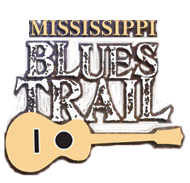R. L. Burnside
R. L. Burnside - Holly Springs
R.L. Burnside (1926-2005) reigned as North Mississippi’s most celebrated blues artist in the 1990s after alternative rock audiences across the country and overseas joined traditional blues aficionados in embracing his exuberant, spirited Hill Country blues. Already a longtime local juke joint favorite, Burnside was the patriarch of a notable family of musicians, including sons Duwayne, Garry, Daniel, Joseph, Dexter and R.L. Jr., and grandsons Cedric, Cody and Kent. Burnside was posthumously inducted into the Blues Hall of Fame in 2014.
R.L. Burnside was a pivotal figure in Hill Country blues history, bringing unprecedented recognition to the music as a distinct genre unto itself while perpetuating the tradition locally and captivating audiences with his performances on several continents. His style grew into a worldwide phenomenon as young blues and rock bands sought to capture the infectious Burnside groove.
Burnside’s music was influenced locally by the legendary Mississippi Fred McDowell and by guitarist Ranie Burnette. Burnside, born in the Blackwater Creek area of Harmontown in Lafayette County on November 23, 1926, also played songs by John Lee Hooker, Lightnin’ Hopkins, Muddy Waters and others. He knew Muddy when he lived in Chicago for a few years and worked at a foundry and a glass company. But most of his life was spent in the counties of Lafayette, Panola, Tate and Marshall, or in Memphis. He managed to support his large family by working as a sharecropper, tractor and combine driver and fisherman—sometimes supplemented by moonshine sales and nighttime earnings from juke joints where he could parlay his skills with guitar and dice. He and Alice, his wife of more than 50 years, operated a juke in their house at times. Only late in life did music become his main source of income, after he began recording and touring under the management of Fat Possum Records of Oxford.
After Burnside’s first recordings for folklorist George Mitchell in 1967 were released by Arhoolie Records, he began to travel occasionally as a solo act, making recordings for small European and American companies, while maintaining his rugged work schedule at home. As his sons grew older, he formed a family band, the Sound Machine, and he also performed as a duo with harmonica player Jon Beckley Morris. He appeared in the 1992 film Deep Blues and developed a wider crossover following through his Fat Possum recordings, which began to incorporate punk rock and hip hop arrangements, an album with the Jon Spencer Blues Explosion, and the inclusion of his music on The Sopranos HBO series. Despite the modern technology featured on some of his later sessions, in person he played the same as he always had, whether at Junior Kimbrough’s juke joint or out on tour at a nightclub, festival or a rock event, often accompanied by his protégé Kenny Brown and grandson Cedric Burnside.
Burnside, whose jovial presence and jokes never failed to entertain, reluctantly retired due to illness in his final years and died at St. Francis Hospital in Memphis on September 1, 2005. R.L. stood for Rural L., according to legal documents, or for Robert Lee, Burnside sometimes would say. To many locals he was known as “Rule” and to his family he was their beloved “Big Daddy.” His sons, grandsons and followers have carried on his music, and Duwayne, Garry, Kent, and Cedric recorded their own albums. Burnside songs have been recorded by the Black Keys, North Mississippi Allstars, Hank Williams Jr., the Nighthawks, Tav Falco, Jimbo Mathus, R.L. Boyce, Robert Kimbrough, Kenny Brown and a host of U.S. and European indie rock acts. Text by Jim O’Neal. Research assistance: David Evans, Jon Beckley Morris, Bob Eagle, and Scott Barretta
This is marker No. 214 on the Mississippi Blues Trail, dedicated February 21, 2024. For more information on Hill Country Blues, see Marker No. 45 at the corner of N. Center Street and East College Avenue here in Holly Springs.

